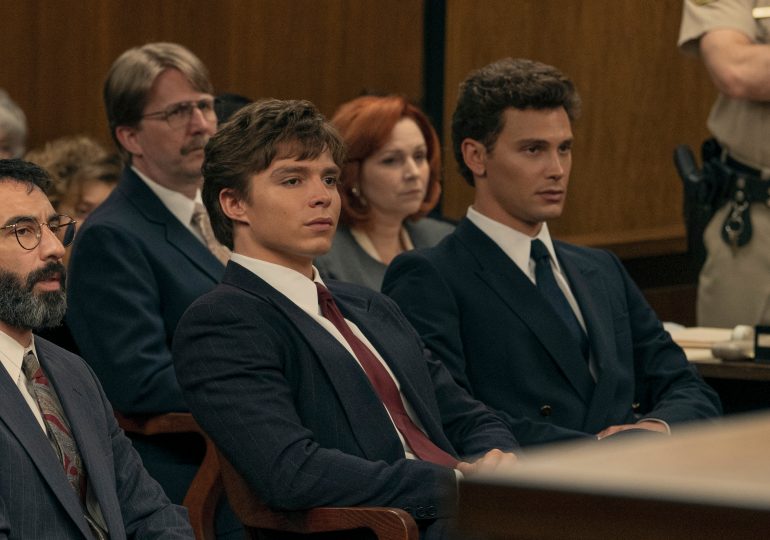A lurid story from history, chiseled stars engaging in heinous acts, a tornado of discourse whipped up so fast Glen Powell couldn’t even tame it, and a carousel of famously camp actors. It can only mean one thing—a new Ryan Murphy true crime joint.
[time-brightcove not-tgx=”true”]
Monsters: The Lyle and Erik Menendez Story hit Netflix last week, the second installment in an anthology that began with 2022’s Monster: The Jeffrey Dahmer Story. Like its extremely contentious predecessor, the series recounts a scandalous crime from history in vivid (and not necessarily entirely factual) detail, this time homing in on the 1989 double homicide of Kitty and José Mendendez at the hands of their sons Lyle and Erik.
Murphy pairs relative newcomers Nicholas Alexander Chavez and Cooper Koch, who play Lyle and Erik respectively, with veterans Chloë Sevigny and Javier Bardem as their parents, for his version of the headline-hitting crime that gripped America at the dawn of the courtroom TV era. What prosecutors presented as a case of two brothers offing their parents for a slice of their multi-million dollar estate was complicated by the siblings’ revelations, on the stand, of decades of sexual abuse perpetrated by their father as their mother looked on, or away, with willful ignorance. They claimed self-defense, arguing that they were convinced their parents were going to kill them, but when the trial came to an end, each one was convicted on two counts of first-degree murder and sentenced to life in prison, where they remain today.
Like Murphy’s Dahmer, the series has beamed a blinding spotlight on a case which had largely receded from regular household discussion in recent decades, though it’s generated interest on true crime podcasts and true crime corners of TikTok. New questions are being raised: Was the jury too harsh on Lyle and Erik? Would the public have more empathy regarding their allegations of sexual abuse if the trial happened today, in our post #MeToo era? How does gender come into play? Is it even ethical to make a series like this when both brothers are alive and still at the mercy of the penal system? And finally, have Ryan Murphy’s deep dives into cases like these veered too far into exploitation? Monsters: The Lyle and Erik Menendez Story has whipped up these unwieldy questions in just a few short days, and the answers have been far from unanimous.
Read more: The True Story Behind Ryan Murphy’s Menendez Brothers Series
Monsters’ depiction of Erik and Lyle Menendez
At the heart of Monsters: The Lyle and Erik Menendez Story are the eponymous brothers, played by Chavez and Koch. The series follows them as they plan and orchestrate the murder of their parents with illegally purchased shotguns, get arrested and jailed, obtain legal counsel and eventually get tried in court. All the while they recount the abusive nature of their past, from graphic details of their father’s repeated and violent sexual abuse to ritual humiliation and neglect from their alcoholic mother.
Chavez plays Lyle as the clearly dominant older brother with little remorse, while Koch’s younger, more vulnerable Erik is doe-like and pitiable. From the jump, the relationship between the brothers is presented as close. A little too close, as Nathan Lane, playing Vanity Fair writer Dominick Dunne, presents with a hammy wink that crushes any notion of subtext. Indeed, incest is touched upon in the series, and a possible sexual relationship between the pair is suggested at multiple points in the episodes as well as marketing materials. There’s a brief power-play kiss in the show’s first episode and then a sequence recounted as rumor later in the show that sees Sevigny’s Kitty walk in on the brothers showering together.
As may not surprise those who’ve consumed much of Murphy’s work, the salaciousness at the heart of the story is handled with little delicacy. Opportunities to empathetically explore the recurring nature of trauma are often abandoned in favor of leaning into titillating taboo.
Online discourse has suggested that the series glosses over the horror of what the Menendez brothers have claimed, although that’s not entirely true. The on-screen brothers recount their abuse in vivid detail, often with such candor as to inspire genuine discomfort in the viewer. One standout episode sees Koch command a 37-minute single-shot scene where he plainly speaks about the grimness of his childhood, with the constant sexual abuse treated as a kind of banality of evil under harsh fluorescent lights.
But this is often undermined by the series’ predilection for smut. You could argue that the juxtaposition between how the brothers retell their traumas over and over and the prurience with which they are treated by the outside world is a reflection of how the public treated their case, but when Chavez and Koch are seen soaping each other up in suds in a vanity shot, it’s hard to conclude that the show is prioritizing respect over low-hanging thrills.
Read more: The Story Behind the Therapist Who Played a Key Role in the Menendez Brothers’ Case
Erik Menendez slams Monsters
While many people online, including those who haven’t sat through the series’ 10 episodes, have loud opinions about Monsters, one voice cannot be ignored: that of Erik Menendez himself.
Erik, who is still in prison in California, released a statement about the series via the X account of his wife Tammie, who he married while incarcerated in 1999. “I believed we had moved beyond the lies and ruinous character portrayals of Lyle, creating a caricature of Lyle rooted in horrible and blatant lies rampant in the show,” the statement starts. “I can only believe they were done so on purpose. It is with a heavy heart that I say, I believe Ryan Murphy cannot be this naive and inaccurate about the facts of our lives so as to do this without bad intent.”
He goes on to say: “It is sad for me to know that Netflix’s dishonest portrayal of the tragedies surrounding our crime have taken the painful truths several steps backward—back through time to an era when the prosecution built a narrative on a belief system that males were not sexually abused, and that males experienced rape trauma differently than women.”
He ends the note by asking, “Is the truth not enough? Let the truth stand as the truth.”
The series examines both Lyle and Erik’s nature in order, perhaps, to get closer to discerning that truth. As the real Erik Menendez notes, Lyle is positioned as a cold-hearted yuppie at many points, though his vulnerability is explored in some moments, especially around how he recounts his experience of sexual abuse and the guilt he felt about not being able to protect his brother.
As for Erik, Murphy mostly interrogates the question marks around his sexuality. During the trial in 1993, the prosecution alluded to Erik’s homosexuality as an attempt to discredit his account of sexual abuse by his father. In the series, Erik’s fluid sexuality is explored explicitly in scenes with a fellow inmate in prison, and he tells his lawyer Leslie Abramson (Ari Graynor) that he doesn’t know how to define himself because his father’s abuse has fundamentally broken him. A lot has changed since the early ‘90s, and we understand culturally the valley between consensual gay relationships and abuse at the hands of a male figure. But Murphy is so obviously drawn to the dark allure of a queer villain and, in this case, that propensity can feel uncomfortably presumptuous.
The case for their exoneration
Even some who are critical of the show’s portrayals may be gratified to see that Murphy’s lens on the Menendez brothers’ story has reignited pleas for their exoneration. For a long time, the dominant narrative drawn from the headlines began and ended with the prosecution’s assertion that they were spoiled rich kids looking to remove a barrier to even greater wealth. As such, their case has been met with little cultural sympathy. But the brothers’ grueling testimony about their abuse was presented, in some scenes, almost verbatim in Monsters, leaving many viewers wondering how such little sympathy had been extended to them during their trial.
As the series progresses, it does increasingly convey empathy for the brothers and offers a substantial amount of screen time to excavating the horrors of their abuse, from grim reenactments in flashbacks to the signs of repressed trauma in their adulthood on the stand.
Now, clips from the brothers’ trial have started re-circulating online, both side by side against scenes from Monsters as evidence of the series’ accuracy and on their own as proof of their trauma. Murphy and co-creator Ian Brennan have said that the idea to make the show was inspired by the prevalence of content related to the case on TikTok, which has a booming true crime community, where many have taken up the Menendez brothers’ exoneration as a cause. The popularity of the show will undoubtedly inspire more to consume their content and join in their effort.
Videos of the trial, the police interrogations, and TV interviews are being ripped and uploaded to the platform in the hundreds, some with flashy pop music-style fancam editing to really level up the sense of dystopia with which these content creators view Erik and Lyle’s imprisonment. Digital armchair detectives can help or hinder a case; sometimes, like in the case of Gabby Petito, who was murdered by her boyfriend in 2021, the scrutiny can lead to new discoveries; elsewhere, as in the often misogynistic response to Johnny Depp and Amber Heard’s defamation trial, they can propagate harmful biases.
Kim Kardashian visits the brothers
Kim Kardashian has become involved in criminal justice reform in recent years, lobbying the President, making the case to exonerate unjustly imprisoned people, such as Alice Marie Johnson in 2018, and, of course, making a reality show about her efforts against mass incarceration.
TMZ reported that the star, alongside Koch, who plays Erik in the series, dropped by the Richard J. Donovan Correctional Facility in San Diego, where the brothers are incarcerated. The visit was to talk about a rehabilitation project for prisoners to spruce up prison yards, which has supposedly been spearheaded by the brothers.
Some may view the visit with skepticism; Kardashian, as well as being active in prison reform, is also a collaborator of Ryan Murphy’s, having appeared in the most recent series of American Horror Story. But whatever the motivations behind the visit, Kardashian’s track record of shining a light on cases that demand to be revisited may ultimately be beneficial to those fighting the cause of exoneration.
Netflix’s spotlight on the case continues
After the enormous success of Monster: The Jeffrey Dahmer Story, it’s clear the streamer expected furious interest in the Menendez case after the release of this series. So they have come prepared with a docuseries to follow up the narrative drama. And this one actually has the cosign from the Menendez brothers.
It was announced on Monday, four days after the release of Monsters, that a docuseries featuring audio interviews with the brothers recorded from prison, among interviews with other key figures from the case, will land on the service on Oct. 7. In the trailer, Lyle says, “Everyone asks why we killed our parents, maybe now people can understand the truth.”
Erik then adds: “We were not the ones who told the story about our lives. Two kids don’t commit this crime for money.”
After Erik’s open disappointment with Murphy’s fictional account of their story, Netflix is poised to take viewers’ fascination all the way to the streaming charts. If viewers were horrified by the liberties taken by Murphy, maybe they’ll watch the Menendez-approved show instead. More than likely, people who guzzled up the series will be hitting play on the docuseries as well.
The devil works hard, but Netflix works harder.
Leave a comment








